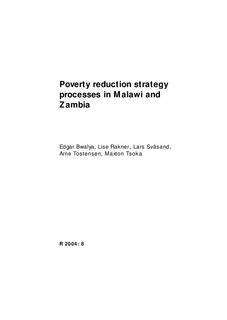Poverty reduction strategy processes in Malawi and Zambia
Research report
Permanent lenke
http://hdl.handle.net/11250/2436000Utgivelsesdato
2004Metadata
Vis full innførselSamlinger
- Bora-import [434]
Sammendrag
Malawi and Zambia are poor and heavily indebted countries whose dependence on foreign aid is pronounced. They both qualify for debt relief in terms of the Heavily Indebted Poor Country (HIPC) initiative under the auspices of the Bretton Woods institutions, provided they formulate a Poverty Reduction Strategy Paper (PRSP) that satisfies the new ‘process’ conditionality which emphasises broad participation. In grappling with the PRSP process the stakeholders (the state, non-state actors, and donors) appear to have produced credible policy documents with a measure of ‘national ownership’. On a comparative note, it is significant that civil society organisations played an active role in both Malawi and Zambia in formulating the PRSP and thus lent the outcome some legitimacy. It is also significant that in both countries the national assemblies were marginalised in these policy-making exercises, which were driven by the respective executive branches of government, notably the Ministries of Finance. In the case of Malawi the modest involvement by parliament was attributable mainly to its general subordination to the executive in a presidential system of government, while the coincidence of the PRSP process and the 2001 elections was the main explanatory factor in Zambia. The donors found themselves in an ambivalent position. On the one hand, in the interest of creating national ownership of the PRSP they were expected to keep their hands off. On the other hand, they were apprehensive that the substantive nature of the final document would not satisfy the World Bank and IMF eligibility criteria for debt relief. Hence, they took active part in the process.
Utgiver
Chr. Michelsen InstituteSerie
Research reportR 2004: 8
